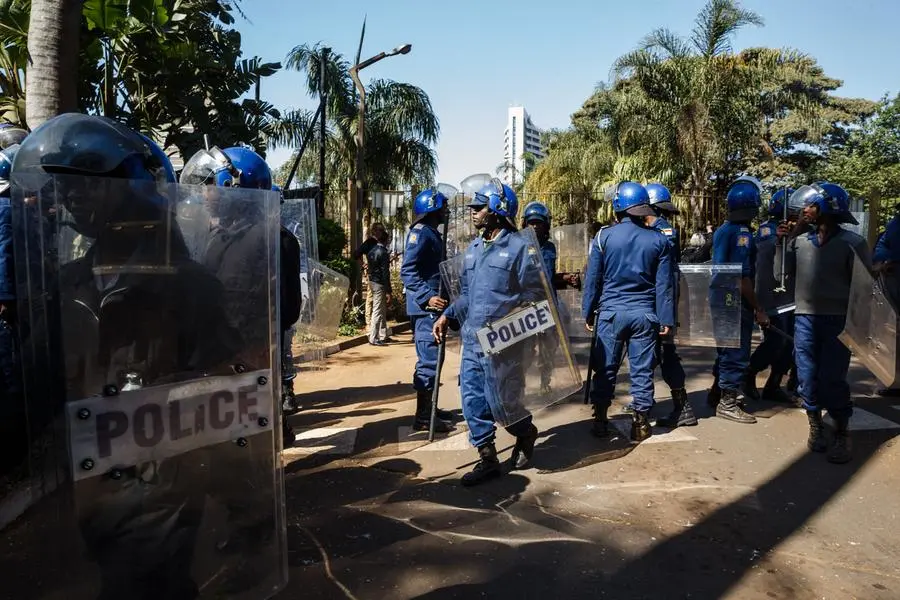PHOTO
Police in Zimbabwe are hunting for seven alleged bank robbers, who are believed to be in South Africa.
They got away with US$4 million (some R70 million), a record for the country, in just a couple of minutes.
On Thursday last week, the robbers pounced on an Ecobank branch in Bulawayo. In under two minutes, the AK47-wielding robbers made off with the cash boxes being unloaded from a cash-in-transit van parked at the bank’s entrance.
Afternoon shoppers took videos and pictures of the robbery as it happened.
A week later, police named the main people responsible, who they believe reside in South Africa, with one said to be operating a trucking business.
Zimbabwe Republic Police (ZRP) spokesperson, Paul Nyathi, said they had contacted Interpol for help.
“When a crime of this magnitude is committed in our country and our investigations suggest the involvement of foreign nationals or the participation of our citizens, who we believe skipped our borders, then we must involve Interpol.
“We are working together as a team and, through our Criminal Investigation Department headquarters, we have been able to engage the other side of the border [South Africa] and we are still pursuing the matter,” he said.
The suspects
Those named are Elijah Vumbunu, his brother, Takafa Vumbunu, David Sawadye, Israel Zulu, Kudakwashe Mudzingwa, Paul Chinake, and Brian Murape.
Elijah is said to be the ring leader. He has a storied life of crime.
In 2018, he was a beneficiary of a presidential amnesty, having served 14 years of a 40-year sentence for armed robbery.
Upon his release, he spoke about what he had lost while in jail.
“It had been communicated to me that my wife had moved on and it hurt, but I just accepted that I had been away for 14 years – she could not have waited that long. After all, she was only 18 years old when I left her,” he said.
Since then, he has featured as an alleged ring leader in numerous unsolved robberies in Zimbabwe.
Before Ecobank, he was implicated with his brother, Tafaka, and Zulu in a 2022 attack on a How Mine security convoy, which was robbed of 11.9kg of gold (worth about R14.5 million) and US$650 000 cash (more than R11 million).
Last year, police said Zulu had been “neutralised” in an exchange of gunfire with officers who were hunting him.
Now, they say he’s alive.
Too much money
The police announced that US$4 million had been taken by the robbers, an amount numerous bankers argue was strange to be kept at a bank branch, instead of a cash depot.
Safeguard, the contracted security company, said it had no idea that it was going to transport such a figure.
Andrew Mallon, the chief executive officer of Safeguard, in a letter addressed to clients, said they should stick to agreed-upon limits for the movement of cash to avoid what occurred at Ecobank.
“A four million dollar move obviously poses a significant risk and is well outside any contracted limit for Safeguard and almost certainly the security industry Africa-wide,” he said.
More robberies
In Zimbabwe, the police adopted a shoot-to-kill policy for armed robbers.
In August, police shot and killed two people from two gangs in two separate raids.
Others were wounded and taken into custody.
Just under a week after the Ecobank heist, an artisanal gold miner in Esigodini, 45 kilometres south of Bulawayo, was raided at home and lost US$45 000 (some R800 000).
On the same day in Harare, the police said an armed group of eight raided a security company and made off with US$23 175 in cash, five firearms, seven pepper sprays, and seven sets of handcuffs.
Police and soldiers in numerous instances have been implicated in robberies.
In some cases, they have been arrested. Most recently in September, two policemen and a soldier, part of a seven-men gang, appeared in court to face 11 counts.
The latest available data from the Zimbabwe National Statistics agency revealed that, between 2020 and 2021, there was an average of 25 armed robberies per day in the country.
© Copyright The Zimbabwean. All rights reserved. Provided by SyndiGate Media Inc. (Syndigate.info).




















